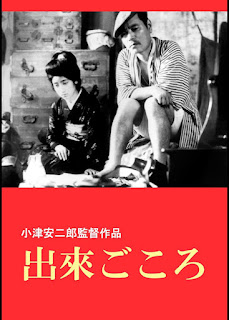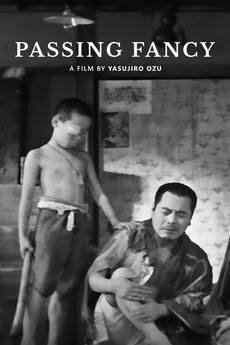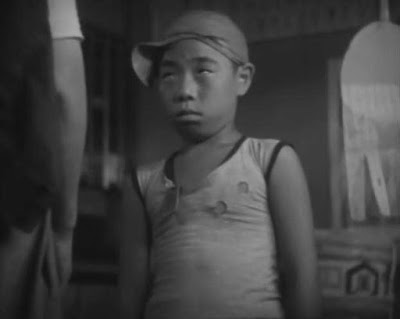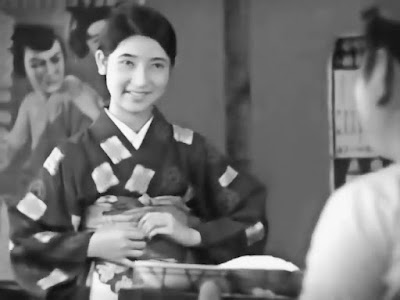Passing Fancy

Director: Yasujiro
Ozu
Year: 1933
Rating: 7.0
Silent Film.
The first in a series of four films from
Yasujirô Ozu starring Takeshi Sakamoto as Kihachi. At the time Ozu
was going back and forth between light comedies, social dramas and in the
same year he even made the gangster film Dragnet Girl. This film has elements
of comedy mixed with social melodrama in an effective manner. It leads off
with comedy for much of the film but then quickly swerves to melodrama and
punctuates it at the end with a piece of lovely sentiment. Kihachi is basically
a comic figure - not educated, a skirt chaser, spends every yen he gets on
drinking with his friend Jiro (Den Ohinata) and barely tries on occasion
to be a father to his son. The absence of the mother is never really explained
but one guesses that she ran off leaving father and son behind. But he is
well-liked by his small poor community around his shanty one room home in
Tokyo for his good nature and ability to make people laugh. He just never
really grew up. This small community is in a sense his family.

His relationship with his 10-year son is
a bit backwards with the son often looking after him and through their often
sullen stand-offs there is a pool of hidden love sitting there. In one scene
the son Tomio has been badly teased by classmates (the older son in I Was
Born, But) about his father being a loser and he comes home and tears the
leaves off a plant in the home. Kihachi smacks him a few times and sits down
whereupon the son comes over and smacks his father many times and Kihachi
just takes it without a murmur of protest. Hard to know exactly what to make
of the scene. Has it happened before one wonders. Early in the film Tomio
has a patch over an eye and you might speculate from a whack from his father
but again but we don't know.

Tomio is played by Tomio Aoki aka Tokkan
Kozo who was the younger brother in the wonderful I Was Born, But in the
previous year. It is a face you can't forget. Ozo must have been fascinated
by it. It is sullenly mischievous but it is completely straight-faced and
rarely shows emotion till he breaks out bawling. He had become a child star
in Ozu's A Straightforward Boy in 1929. He has future Yakuza strong-armed
man all over him but in fact he went on to a long career in films - even
up to 2004 when he died - with Pistol Opera on his resume as well as three
Stray Cat Rock films in the 70's. I bet I could pick him out in a second.

A young homeless waif of a woman (Nobuko
Fushimi) comes to Kihachi's attention and he finds her a place to stay and
work with the female café owner Otmoe (Chôko Iida - 277 credits
on IMDB and in many Ozu films) and begins to immediately fall for her. Not
difficult to do as she falls into Ozu's type at the time - shy, pretty, modest,
traditional and a wonderful smile that slips out from time to time. But Kihachi
is twice her age and she is attracted to his younger friend Jiro who wants
nothing to do with her. This all plays out very gently against expectations.
In one of his few kind acts towards his son Kihachi gives him a bit of money
which the boy spends on sweets and gets very sick - near death sick - and
this brings everyone together. This father-son antagonism plays out in a
few Ozu films - perhaps reflecting his own relationship with his father.
Here it is rather simplistic with little nuance or subtlety but it is still
makes its mark on you. Not topnotch Ozu but it already has some of his touches
on hand. After seeing the documentaries about his preference for low camera
placement it is impossible not to notice how often the camera is looking
up at standing people and parallel with sitting or lying down people.




